Great naturalist. Vladimir Ivanovich Vernadsky
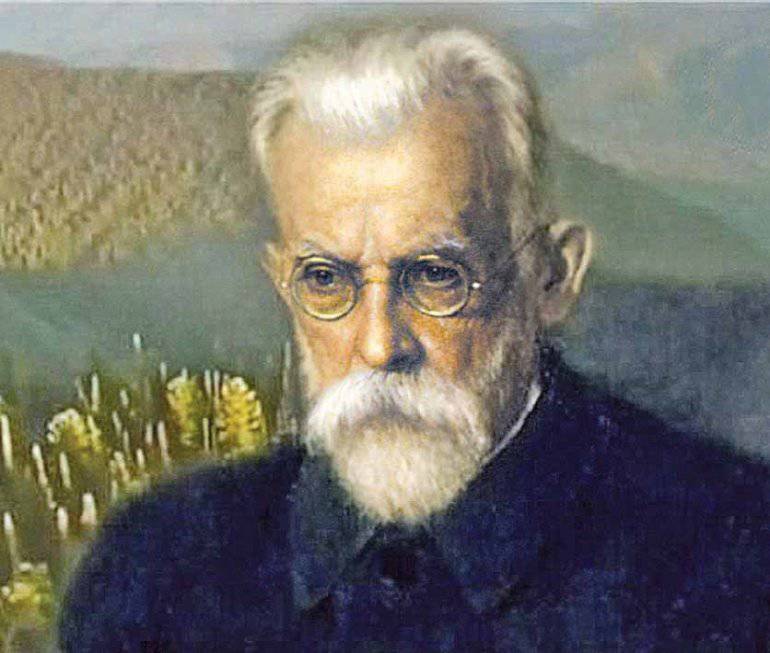
"All story Science proves that, in the end, a lonely scientist is right, seeing that others were unable to realize and appreciate in a timely manner. ”
Vladimir Ivanovich was born 28 February 1863 year in St. Petersburg. His parents, professor of statistics and political economy Ivan Vasilyevich Vernadsky and Anna Petrovna (nee Konstantinovich), had Ukrainian, or, as they said at that time, Little Russian, roots and each other were distant relatives. According to family legend, the forefather of the family was a certain Verkh nobleman, who went over to the side of the Zaporizhzhya Cossacks in the era of the hetmanship of Bogdan Khmelnitsky. His descendants, Vernatsky (according to the later writing of Vernadsky), were enrolled in the number of Chernihiv nobles, despite the fact that their rights to “nobility” were dubious. However, Vasily Vernadsky - Vladimir Ivanovich's grandfather - took part in the Suvorov Italian campaign and rose to the rank that granted him the right to the hereditary nobility.
A year after Volodya’s birth, two more children appeared in the Vernadsky family - twin daughters Olga and Ekaterina. From his first marriage, Ivan Vasilyevich also had a son, Nicholas. He taught Vernadsky Sr. at the Alexander Lyceum and at the St. Petersburg Polytechnic Institute, and also led the Political and Economic Committee of the Free Economic Society for some time and published the Economic Pointer magazine - to put it simply, was a fairly prominent figure in the social and political life of the country 1850-1860. . However, at the beginning of 1868 it was hit hard, and since then, Ivan Vasilyevich started having problems with speech. Teaching activity became impossible for him, and he accepted the offer to become the head of the State Bank office in the city of Kharkov.
In the fall of 1868, the Vernadskys moved to Kharkov, where they spent the next eight years. It was here that the formation of the personality of Vladimir Ivanovich began. As it was done at that time, preparation for the gymnasium was at home, with great attention being focused on the study of foreign languages — as a young man, Vladimir mastered English, German and French. With unlimited access to his father’s extensive library, the boy read a lot. Then his two main interests were revealed - history and natural science. At a young age, Volodya managed to master Tatishchev's “History of Russia”, despite the fact that her archaic language, created on the chronicle texts, is difficult even for adult readers.
It is necessary to note the enormous influence on the teenager of his uncle Evgraf Maximovich Korolenko. A retired military and self-taught naturalist, he had a rather original idea of world order. Evgraf Maksimovich did not dare to publish his works into the light, however, he often “tested” them at his nephew, finding in him a grateful listener. From his uncle’s conclusions, Vladimir was breathtaking - according to Korolenko’s reasoning, “Earth was a living organism, and the entire organic world was busy moving materials from the inorganic world.” By the way, the main scientific ideas of Vernadsky are quite consonant with this statement. The scientist himself, realizing moral responsibility before his uncle, later said: “Sometimes it seems to me that not only for myself, but also for him I have to work, that not only mine, but his life will remain a gift lived if I don’t do anything” .
In 1873, the Vernadskys' family went abroad, and the following year, Volodya entered the gymnasium. He studied in the middle - aptitude for classical languages (the main subjects at the time) the guy did not have. To some extent, this was hampered by his excessive fascination with books. And at 1874, at the age of twenty-one, his stepbrother Nikolay, who was very fond of Volodya, died of a kidney disease. His father did not want to stay in Kharkov, where everything reminded him of the eldest son. The Vernadsky family went on a trip again, visiting the cities of Italy, Switzerland and Germany. In 1876, they returned to St. Petersburg. The educational process in the first St. Petersburg gymnasium was put better, however, this did not affect the performance of Vladimir Ivanovich. His grades improved somewhat, but he was still not listed among the first students.
In 1881, Ivan Vasilyevich was struck by a second stroke, after which he could only move in a wheelchair. Vladimir, who was studying at the senior class at that time, did not attend a gymnasium for more than half a year, caring for his father. Despite this, he successfully passed all exams and entered the natural department of the Physics and Mathematics Faculty of St. Petersburg University. The student life of Vernadsky turned out to be completely different from the gymnasium one. Lectures were given by leading Russian scientists who immediately asked the listeners the highest level of requirements. Already in his first year, Vladimir Ivanovich listened to lectures by Andrei Beketov, Alexander Butlerov, Dmitry Mendeleev.
It should be noted that Petersburg University at that time was a hotbed of sedition - a significant number of revolutionaries were recruited from among students, mostly natural scientists. Two years after Vernadsky's admission, Alexander Ulyanov appeared in the natural department, taking over the post of secretary of the student scientific and literary society at 1884. He was enthusiastically engaged in zoology, and the professors saw in him the future pride of Russian science. However, in 1886, together with his comrades, Ulyanov switched to the preparation of the murder of Alexander III. This example well shows that Vernadsky, who is opposed to the existing government, could easily and imperceptibly pass the fatal edge - the “enthusiasm for science” did not guarantee “protection” from revolutionary ideas. Suffice it to say that Vladimir Ivanovich and his friends, having access to the copying technique, were engaged in illegal samizdat, copying not only the "Confession" of Tolstoy, but also pamphlets of revolutionary content.
10 November 1882 students of St. Petersburg University organized a gathering and were sent in full force to the Manege, where they were released after the census. This event had very important consequences for the future scientist. In Manezh, he met (and made friends for the rest of his life) with philologists Sergey and Fyodor Oldenburg, Dmitry Shakhovsky, historian Alexander Kornilov. After 1891’s death in the fall, Alexandra Oldenburg (the wives of Sergey and the general pet), the comrades approved the provisions of the Brotherhood formulated by Shakhovsky: work as much as possible, consume as little as possible, and look at other people's misfortunes as their own. The most important thing for friends, no matter how their personal fate developed in the future, was spiritual unity and an attempt not to separate their own lives from the life of Russia.
Already in the first years of study at the university, Vladimir Ivanovich decided to devote himself to science, but for a long time he could not decide what he should do. Being scattered, he attended lectures at two departments of his faculty, and also ran on historical-philological. Finally, the young man made a choice - in 1884 his specialization was mineralogy. It was taught by an outstanding scientist and original person Vasily Dokuchaev, who in those years was developing a new science called soil science. Vasily Vasilyevich sought to develop a soil map of Russia, for which he needed to carry out an enormous number of field studies. Catastrophically there were not enough assistants, and Dokuchaev, in order to attract students, organized geological excursions, clearly showing young people how modern relief was formed under the influence of various factors. One of such trips (to Sestroretsk) made an indelible impression on Vladimir Ivanovich, prompting him to actively engage in the work of Dokuchaev's expeditions. He visited the Ekaterinoslav Governorate, collected samples of local soil for his teacher, and then went to the Nizhny Novgorod expedition, where he performed the first independent geological study, published the following year.
In March, 1884 died Vernadsky Sr., having bequeathed his son Vernadovka, located in the Tambov province. Not wanting to leave his mother alone, the young scientist refused the offer to go on an internship abroad. In May, at the request of Dokuchaev, he took part in the organization of the Mineralogical Cabinet, the post of keeper of which he took at the end of the year after graduation from the university. In the same year, another significant event for Vernadsky happened - in the circle on the study of folk literature, he met Natalia Egorovna Staritskaya, by the way, the daughter of a member of the State Council and one of the most prominent figures in judicial reform. They became friends, and in the spring of 1885, before the next geological journey to Serdobol, Vladimir Ivanovich made a proposal to the girl. A refusal followed, but the young man did not give up and continued courting. The repeated "assault" in June of 1886 was successful; on September 1886 they were married, marking the beginning of a long and happy life together. In August, their firstborn, George, was born to 3, and their daughter Nina was born in 1887.
In March, 1888 Vernadsky set off on a two-year business trip to Western Europe, which had a significant impact on his fate. He visited Switzerland, Austria, France, Germany, Italy and England. During the work of the International Geological Congress held in England, the young scientist met with a professor at Moscow University Alexei Pavlov, who, astounded by the knowledge of Vladimir Ivanovich, invited him to move to Moscow and take the department of mineralogy. Thus, after fruitful expedition work in the Poltava region in the summer of 1890, Vernadsky arrived in Moscow. Formally, the young scientist took the place of a privat-docent (lecturer) and began to lecture on mineralogy, as well as engaged in the analysis of a vast mineralogical collection that was in complete disarray. Over time, a whole Mineralogical Museum was established on the basis of this collection.
By the fall of 1891, Vladimir Ivanovich completed his dissertation, which he successfully defended at alma mater. After that, he was introduced to the staff of Moscow University and during the first three years he developed his own course, separating physical discipline crystallography from mineralogy based on chemistry. Like Dokuchaev, Vernadsky began to conduct special mineralogical excursions for his students. In 1895-1897, he and his students visited the Urals three times, bringing back a lot of rock samples. At 1899, he conducted research in the Caucasus and the Crimea, finding bauxite on Taman. At 1902, a scientist organized a trip to the oil fields and visited Shemakha, Baku and Grozny. Thanks to these expeditions, Vernadsky had many students, many of whom later became major scientists. Twice Vladimir Ivanovich went abroad (at 1894 and 1902), and at 1900 attended the next Geological Congress in France. The main thing in these travels for him was a lively communication with prominent scientists, as well as acquaintance with the new literature. By the way, without becoming a revolutionary, Vernadsky, in relation to the existing government, always adhered to opposition views. Numerous trips abroad were not only scientific trips, they gave the scientist the opportunity to communicate with Russian political émigrés, as well as to study books prohibited in their homeland. In this regard, in 1890, the secret police opened a “case” for the scientist and didn’t leave 1917 to the revolution itself.
In May, 1897, a thirty-four-year-old Vernadsky, defended his doctoral dissertation written in just a few months, which enabled him to take the place of an extraordinary (or junior) professor. Prior to the ordinary professor, he was promoted only five years later. Scientifically-organizational and teaching work Vernadsky combined with no less active social activities. He carried it out in close cooperation with the other members of the Brotherhood. After the poor harvest of 1891, Russia began a terrible famine, from which in the European part of Russia, according to various estimates, from four hundred to six hundred thousand people died. At this difficult time, the intelligentsia began to raise funds to help the peasants, and Leo Tolstoy urged not to give back the collected zemstvos and committees by creating public canteens themselves. So, about eight thousand canteens and more than one and a half thousand bakeries appeared in the country, which helped six million people to survive. The “brothers” also took an active part in the creation of public canteens. Their center was the estate of Vladimir Ivanovich Vernadovka. Retired Kornilov went there, and the rest went to fundraising. The actions of the Brotherhood as a whole turned out to be extremely effective - they managed to open one hundred twenty-one canteens, in which over six thousand people were fed. Along with this, when confronted with the opposition of government bodies, the “brothers” became convinced that cultural activity alone was not enough. The accession to the throne in 1894 of Nicholas II brought great disappointment - the young king, who was indifferent to politics, rejected all hopes of the possibility of reforms. Not recognizing the revolutionary methods of struggle, the "brothers" came to the conclusion about the creation of a political party that would gradually prepare the country for the introduction of the constitution.
So, with the beginning of the twentieth century, political problems came to the fore in the life of Vernadsky. In July, 1903 Vernadsky took an active part in the organization of the Union of Liberation, a prototype of the Cadet party. The congress convened illegally in Germany (in Constance and Heidelberg), and, to keep an eye out - the secret police did not sleep - its meetings were held under the guise of geological excursions. The future cadets considered the zemstvos to be the main conduit of their influence, and special hopes were pinned on the Zemsky members ’congress assembled without the permission of the 1904 in November. For the first time in the history of Russia, its delegates clearly and publicly raised the question of the introduction of democratic freedoms and the constitution. Among other delegates, Professor Vernadsky was also listed. The authorities tried to get rid of insignificant promises that gave rise to the revolution. But if the tsarist government was still ceremonious with liberals - well-to-do people, then 1905, who wanted to file a petition to the tsar in January, was shot by the workers directly at the Winter Palace.
During the years of the First Revolution in Russia and the subsequent reaction period, Vladimir Ivanovich continued his political activities. In 1905, he took part in the Moscow Zemsky Congress and entered the Central Committee of the Cadet Party founded in October. At his apartment, "focused the secretariat of the city committee and the party secretariat, as well as a kind of center for all university affairs and issues." In January, 1906 for the anti-government propaganda arrested the son of the scientist George, and Vernadsky only with the help of a long-time friend and influential official Sergei Kryzhanovsky managed to rescue him from prison. And in April of the same year, the professor became an elected member of the State Council (from universities), but the meetings made such a depressing impression on him that the scientist soon stopped attending. The final of his political activities in the pre-revolutionary period was the voluntary departure from Moscow University, undertaken at the beginning of 1911. It all started with the death of Leo Tolstoy 7 November 1910. A group of university students participated in his funeral. Having learned about this, the Minister of Public Education forbade them to continue like that, to which the youth responded with a protest. Troops were sent against them, the police began a "showdown" with the instigators of the riots. The rector of the university, together with his assistants, demanded that armed people be removed from the university premises, but the “defenders” were removed from their posts and excluded from the professors of the institution. And then twenty-one leading university professors (including Vladimir Vernadsky) resigned in protest. They were supported by over a hundred ordinary teachers, that is, almost a third of the entire teaching staff. The question of human dignity, these people put higher than personal well-being - many of the "refusers" were not financially secure people. There were no more examples of this kind in the history of Russian higher education.
Vladimir Ivanovich, elected, by the way, in April 1908 was an extraordinary academician, moved to St. Petersburg and got a job at the Academy of Sciences, heading there (or becoming a member) two dozen institutions, including the Geological and Mineralogical Museums. In 1912 he received the title of ordinary academician. Vladimir Ivanovich did not want to become a cabinet scientist and continued to participate in various geological expeditions. He visited Italy, Norway, Greece, the USA and Bulgaria, and also traveled extensively in the Urals, Trans-Baikal, and Central Asia. The search for radium ores has become a new direction of its activity. Having fully appreciated the importance of research on the topic of radioactivity, Vladimir Ivanovich was one of the first to understand that the study of radium energy is not only an urgent task of science, but also a matter of national security. Thanks to his efforts, the Radium Commission was established at the Academy of Sciences, and about 1913 thousand rubles were allocated for research in 800. The peak of the organizational activity of Vladimir Ivanovich was the establishment during the years of the First World Commission for the Study of Natural Productive Forces (abbreviated KEPS).
1916 was a very important year for Vernadsky in shaping his scientific worldview. He undertook (from his own point of view) to study biological literature, which allowed him to formulate the definition of living matter as an aggregate of organisms involved in geochemical processes. At the previous stage of his activity, the scientist looked at the evolution of the earth's crust from the standpoint of the cycle of chemical atoms in nature. Now he assumed that a substantial part of this movement is directly related to the vital activity of living organisms, primarily bacteria. At the same time, Vernadsky formulated the goals and tasks of absolutely new sciences - geochemistry and biogeochemistry.
1917 came the year, and the revolutionary events again dragged the fifty-four year old scientist into big politics. As a member of the State Council, he signed a telegram to the tsar with a proposal to abdicate, entered the Commission on the Reform of Higher Educational Institutions in March, and in September became one of the deputies of the Minister of Public Education. Three weeks after the Bolsheviks came to power, Vladimir Ivanovich signed the appeal “From the Provisional Government” and in order to avoid arrest, the next day he left with his family in his Poltava estate Shishaki. Having reached the estate without incident, the scientist after a while realized how dangerous it was to remain alone in this deep place, and moved to his wife's relatives in Poltava.
Ukraine was self-determined at that time - the government of the 1918, the proclaimed independence of the Central Rada in March, was overthrown by the Germans who had captured the country. Pyotr Skoropadsky, who received “hetmanism” from the invaders, did not speak Ukrainian, and therefore did not conduct the Ukrainization of public and state life. She, it should be noted, Vernadsky was extremely hogwash. Therefore, when Skoropadsky made him an offer to create the Ukrainian Academy of Sciences, the scientist agreed only under the following conditions: he would not personally accept Ukrainian citizenship, the Ukrainian Academy will be created as a branch of the Russian, the Ukrainians who will work in it must “love Russian culture, for them native ", the Ukrainian language will not be used in natural science and in accurate studies. The hetman did not object to such demands, and Vladimir Ivanovich set to work. He managed to lay the core of the organizational structure of the Academy, organize the National Library and deploy a number of research institutions. Soon after the official creation of the Academy - 27 on November 1918 - the Germans left Kiev. In the next few months, the power changed several times, and each time the scientist tried to save his brainchild from defeat. The efforts to preserve the Academy of Sciences forced Vernadsky at the end of 1919 to go to Denikin in Rostov, and there he learned newsthat Kiev in the hands of red, and his family moved to the Crimea. In January, 1920 Vladimir Ivanovich also went there, but on the way he fell ill with typhus and for more than a month was on the verge of life and death. Fortunately, he recovered and soon agreed to take a chair in mineralogy at the newly founded Taurida University. The classes there were mostly refugees, with the result that the faculty was brilliant. In October, the rector of the university passed away 1920, and Vernadsky became the head of the only “White Guard” university in Russia at that time. But his reign did not last long - on November 11, the Red Army troops, supported by Makhno, occupied the Crimea. Vernadsky first decided to go to some calm country and surrender to scientific work there, but at the last moment he changed his mind - it became a shame to a scientist who had not had the opportunity to do this like ordinary university staff.
The Soviet government regarding “bourgeois specialists” had its own plans - in February 1921 was attached to the ambulance train by a “professorial train” in which Vladimir Ivanovich, his colleagues and their families, after a month and a half of an agonizing trip, were taken to Petrograd. There Vernadsky began his usual social and scientific activities. In the summer, the scientist 1922, thanks to the troubles of his friend Sergei Oldenburg, the permanent secretary of the Academy of Sciences, went with his wife and daughter to Paris for a five-month business trip.
This trip gave the scientist the opportunity to look around and make the final decision: whether to stay in Soviet Russia or not. Vladimir Ivanovich had to solve this dilemma in the mid-twenties. Having read a course of lectures on geochemistry at the Sorbonne, the scientist engaged in their publication, which is why he asked to extend the trip. Thanks to the efforts of the same Oldenburg, he was allowed to stay abroad until the summer of 1924. During this time, Vernadsky managed to talk with various international organizations on his project to establish a biogeochemical laboratory, but everywhere he was refused. The Geochemistry released by him was noticed, but did not receive any noticeable resonance in the scientific world — first of all, scientists were attracted by the revolutionary discoveries in physics: Einstein's theory of relativity and quantum mechanics. When the term of the second trip was already over, Vernadsky sent an application for a grant to the French fund Rosenthal and suddenly received thirty thousand francs. This was not enough for the formation of the biogeochemical laboratory, but some research was carried out. The result of intense activity was the famous "Biosphere" - in the book the eminent scientist not only explained this concept in detail, but also gave the formula for the distribution of living matter on the planet. Because of this work, he had to arbitrarily delay his return to his homeland for another year, for which Vernadsky was expelled from the number of academicians. Despite this, Vladimir Ivanovich made a decision to return to Russia, and in March 1926 he and his wife arrived in Leningrad. Daughter Nina married the famous archaeologist Nikolay Toll and remained to live in Prague.
As soon as he got involved in Soviet life, Vernadsky continued his stormy organizational work. In a short time, he organized the Biogeochemical Laboratory and the Commission on the History of Knowledge (today the Institute of History of Engineering and Natural Science). Back in 1921, when one of Vernadsky's students, Vitaly Khlopin, managed to get 4,1 milligrams of highly active radium, Vladimir Ivanovich created three new institutions - Radium, Physical-Technical and Medical-Biological Institutes. By the end of the twenties, they, along with KEPS, which continued to operate, became large research organizations that were constantly expanding their activities. They were financed very poorly, and the work was done on the enthusiasm of the employees, but they were quite fruitful.
In 1929, Sergei Oldenburg was removed from his post, and Marxist philosophers who had joined the Academy (Vernadsky called them “diamats”) began to actively intervene in her inner life. When publishing, Vladimir Ivanovich's new articles began to be accompanied by comments in which the editors dissociated themselves or directly condemned his “idealistic” philosophical views. Fortunately, the articles of the scholar themselves were published without distortion. The content of their “diamats”, and even more so party leaders, was for the most part incomprehensible. However, the latter were aware that Vladimir Ivanovich was a scientist of the first magnitude, and therefore he, like just a select few, was allowed a lot. In particular, Vernadsky almost every year went abroad for several months, working in local scientific institutions and libraries at his own discretion (his last trip abroad was at 1936). At the same time, the scientist had no illusions about what was happening in the country. In his diary, he recorded absolutely seditious things that contemporaries were afraid to say even in a whisper. Vernadsky wrote in detail about repression, about hunger, about the worthless superiors, fearlessly defended his colleagues, students and friends, and he regularly wrote letters and sent books to convicts. After 15 on April 1939 was shot by Vernadsky’s old friend Dmitry Shakhovskoy, the academician took his daughter Anna to the secretary. There is evidence that at the end of the 1930s he sent a note to the Presidium of the Academy proposing to collectively condemn the arbitrariness of the authorities, which horrified the other academicians.
Sergey Oldenburg died on February 28, 1934, and soon after that the process of transferring academic institutions to Moscow began, which finally buried the traditions of the pre-revolutionary Academy of Sciences. In the summer of 1935, Vernadsky also moved to Moscow. The reorganization was associated with preparations for a new world war that began in the United States and in all the leading countries of Europe. It was required to collect reserves of strategic raw materials in advance (in particular, some rare-earth and non-ferrous metals), without which it would be impossible to win the upcoming “war of motors”. In such an environment, the knowledge of the old scientist was of great value, and Vernadsky was given special conditions, both in creative and material (personal car, increased rations and salary) respects. Vladimir Ivanovich was also allowed to correspond with his anti-Soviet son, as well as write out any literature from abroad without checking it with censors. Instead, it was required to give expert assessments of problems of interest to the authorities from time to time. One of them, in particular, was the issue of nuclear weapons. Shortly after the start of World War II, the academicians Vernadsky and Kapitsa independently confirmed the possibility of creating an atomic bomb in five to seven years, prompting research in this direction. At the initiative of the scientist, full-scale exploration and mining of radioactive ores was also resumed.
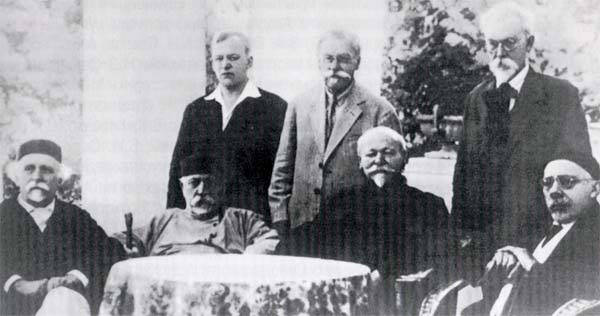
From left to right: N. D. Zelinsky, I. A. Kablukov, N. M. Kizhner, A. N. Severtsov are sitting; stand N. N. Luzin, M. N. Rozanov and V. I. Vernadsky. Xnumx
At that time, Vladimir Ivanovich was interested in something else. He came to the thoughts expressed by the leader back in 1913 (!) And in his old age had no desire to engage in the development of weapons. Even radio geology, the last of the sciences he founded and studying the laws of the course of nuclear reactions in the natural environment, did not interest the scientist as much as the development of the idea of the biosphere. At the same time, Vernadsky began to use the concept of the noosphere, seeing in the activity of the human mind an independent geological force, the importance of which was constantly growing. According to the scientist, the scale of human intervention in nature has become so large that in energy terms it is compared with the impact on the planet of the entire biosphere. He said: "In a complex manifestation of consciousness, there is nothing important or unimportant and nothing is accidental."
In 1941, a scientist wrote in his diary: “17.05. They say that German troops are on the border ... The future is fraught, but I am confident in the strength of the Russian (Ukrainian) peoples. They will stand. Soon after the war began, evacuation to the rear of academic institutions began. Academics of advanced age, including Vernadsky, were sent to Borovoye - a Kazakhstan resort located by the picturesque lake Burabai. At this point, the scientist prepared two new books: "The chemical structure of the Earth's biosphere" and "On the states of space in the geological shells of the Earth." And in early February, 1943 academician suffered a terrible blow - his wife Natalia Yegorovna left the life of a transient disease, without whose help Vernadsky’s scientific path would not have been so fruitful. What remained to the old scientist who was not accustomed to sit idle? Just keep working. In the spring of 1943, he turned eighty years old, and in honor of his jubilee, Vladimir Ivanovich asked the Academy of Sciences to print his latest work in Russian and English. However, this did not happen, for the first time she saw the light in 1980. Instead of publishing the book, the scientist was given the Stalin Prize, half of which (100 thousand rubles) he immediately transferred to the needs of defense. He distributed the rest of the money to acquaintances and half-acquaintances. In particular, the Soviet geologist Boris Lichkov, who was dying in Samarkand from starvation, received a thousand rubles, six thousand - the widow of Sergey Oldenburg.
In August, 1943 Vernadsky appeared in Moscow. Here a huge empty apartment awaited him. He seriously began to think about going to America to his children, but nothing came of it. 24 December The great scientist had a brain hemorrhage 1944, and on January 5 6 1945 was gone by Vladimir Vernadsky.
Even decades after his death, his works were published with great distortions and bills. And it was no accident. First, in the study of manuscripts, it was discovered that an academician in Soviet times absolutely did not follow the rules of political correctness. Secondly, the works of Vernadsky had an unacceptable feature for Soviet academicians - his teaching turned out to be incompatible with the invented physicists and the scientific picture of the world generally accepted in the second half of the twentieth century. Vernadsky, for example, denied abiogenesis (the emergence of the living from the nonliving). And without this assumption, all cosmological theories developed by physicists like the Big Bang hang in the air. To neutralize the ideas of Vladimir Ivanovich went the tried and tested way - extolling his name in words, but silencing the true definition of the biosphere.
Vernadsky's son, George, had the imprudence to lead the press department in the Wrangel government, which made his departure abroad inevitable. For some time he lived in Greece, then taught at Charles University in Prague, and settled in the USA at 1927, taking the position of research assistant at Yale University. There he, being the only expert on the history of Russia, wrote many books on the history of our country, prepared a number of students, and participated in the creation of a separate department of Russian history. He died in June 1973 in New York. On him, the Vernadsky family was cut short.
According to the sites http://vernadsky.lib.ru/ and http://www.vernadsky.ru/.
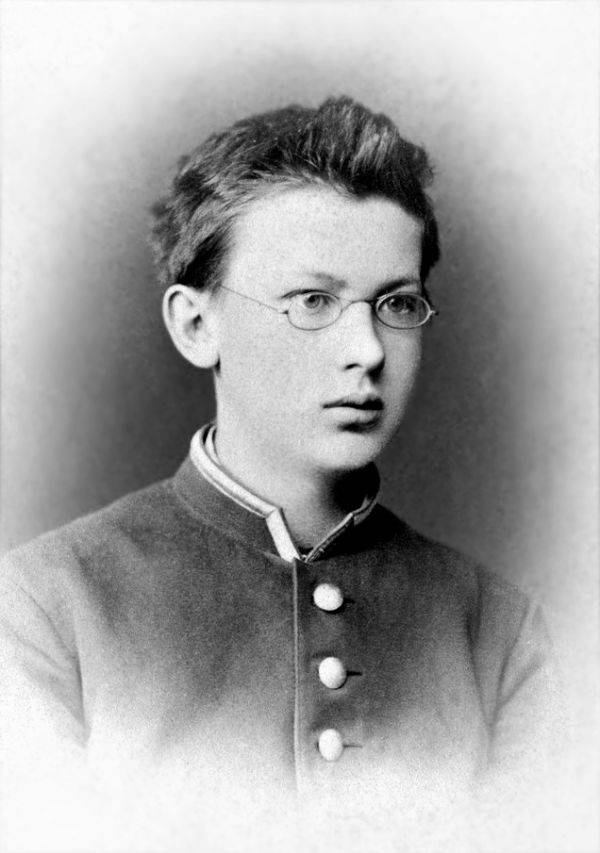
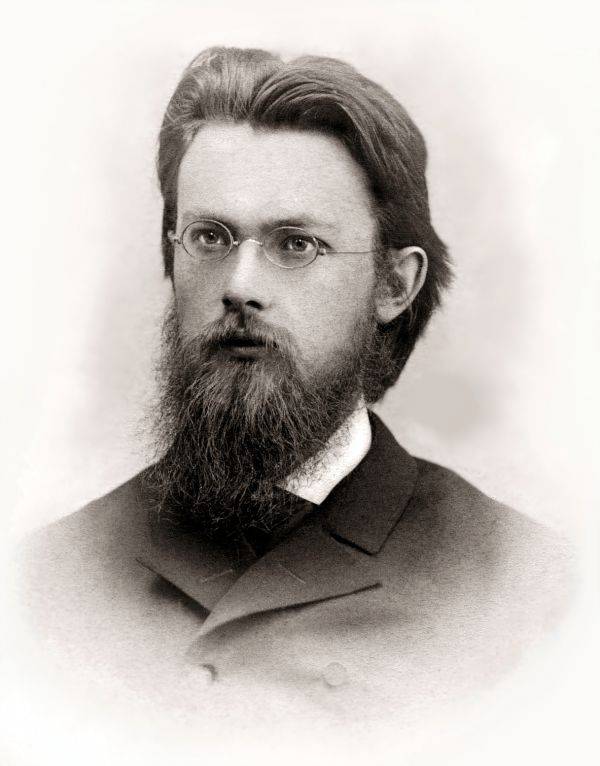
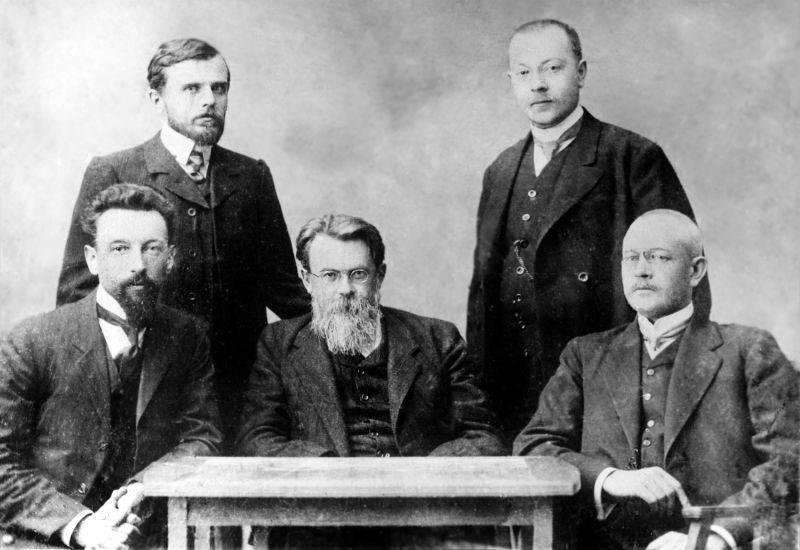
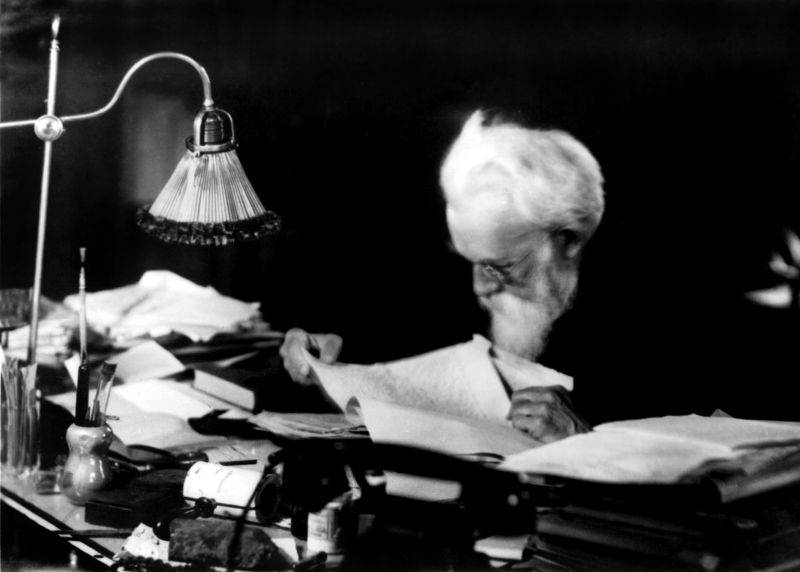
Information